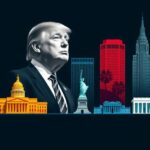U.S. Implements New Export Controls Amid China’s Technological Advancements
The Biden administration has announced the implementation of new export controls focused on critical technologies, including quantum computing and semiconductor products, in response to China’s notable progress in the global chips industry. These regulations were made public on Friday by the U.S. Department of Commerce and encompass a range of technologies such as quantum computers and their components, advanced chipmaking machinery, specific software related to metals and metal alloys, as well as high-bandwidth chips essential for artificial intelligence applications.
The Department of Commerce has indicated that these measures are motivated by national security concerns and foreign policy imperatives, resulting from comprehensive consultations with global allies. The new restrictions will apply to exports worldwide but will permit exceptions for nations that adopt similar controls; notably, Japan and the Netherlands have previously taken such actions. Alan Estevez, the Under Secretary of Commerce’s Bureau of Industry and Security (BIS), emphasized that these developments are crucial in aligning U.S. export controls with the rapidly evolving technology landscape, enhancing their effectiveness in coordination with international partners. According to Estevez, these aligned controls on quantum and advanced technologies will significantly hinder adversaries from acquiring and utilizing these technologies in a manner that jeopardizes collective security.
A 60-day public comment period has been established before the finalization of these rulings, marking an opportunity for stakeholder input. As both the United States and China strive for dominance in quantum computing—viewed as a game-changing sector—the United States’ actions appear deeply rooted in a strategic response to Beijing’s ambitions in artificial intelligence and computing technologies, although China is not explicitly mentioned in the export documents.
In parallel, the BIS continues to cultivate relationships with allies to enhance the efficacy of export controls aimed at undermining Russian military capabilities and its affiliates, including Belarus and Iran.
As the United States intensifies its restrictions, China is reportedly accelerating efforts towards technological sufficiency and is investing heavily in critical sectors to bolster its chip manufacturing capacities. Recent analyses conducted by the semiconductor research firm TechanaLye, based in Tokyo, suggest that Chinese-produced processor chips are narrowing the technological gap to merely three years behind the leading industry player, Taiwan Semiconductor Manufacturing Company (TSMC).
Despite the U.S. government’s commitment to stricter controls, the global semiconductor industry is exhibiting a degree of hesitance. Because China represents the largest semiconductor market globally, many top semiconductor firms, including those based in the United States, continue to rely heavily on Chinese clients for their operations.
In response to the imposed restrictions, the CEO of ASML, the prominent Dutch chip equipment manufacturer restricted from selling its cutting-edge semiconductor technology to China, has expressed concerns that U.S.-led prohibitions increasingly encompass economic motivations, anticipating further resistance from industry stakeholders. The government of the Netherlands has indicated that it will consider ASML’s economic interests when reassessing its own semiconductor export regulations. Furthermore, the Trade Minister of South Korea, Cheong Inkyo, suggested that the U.S. ought to provide additional incentives to encourage compliance with stricter curbs on Chinese semiconductors. Notably, Beijing has consistently characterized the U.S. and allied export controls against its semiconductor industry as anti-competitive, asserting that they undermine the integrity of the global semiconductor supply chain.








Post Comment